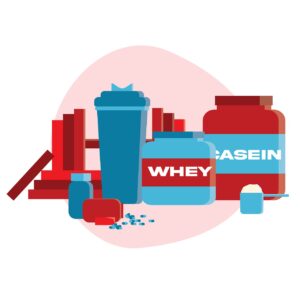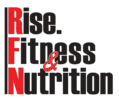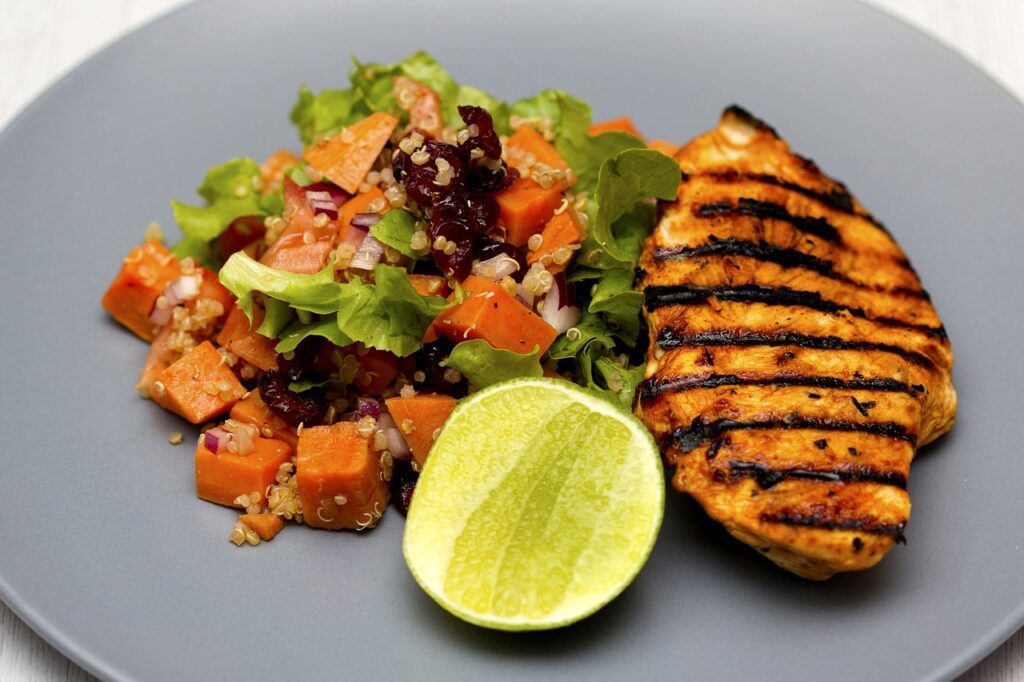True story!
On my podcasts I often talk about protein and some time ago I went for lunch with a group of friends to a BBQ restaurant called “SmokeHouse” here in Tokyo.
We ordered a big combo platter of different cuts and meats and to my surprise a couple of my friends repeated my ongoing motto: “#eatyourprotein!” and they told me that every time they approach a meal they kind of hear my voice saying it.
Albeit it does sound a bit scary, it makes me smile to imagine you hearing my voice prompting you to have protein!
Let’s give protein its definition
Protein are organic molecules made up of amino acids – the building blocks of life. These amino acids are joined together by chemical bonds and then folded in different ways to create three-dimensional structures that are important to our body’s functioning.
Key information to retain: protein are made of amino acids that are the building blocks of life. Keep this concept in mind.
When it comes to amino acids, there are 2 main different categories:
- essential amino acids that our body needs them from our diet because it cannot make enough on its own, for example the extra famous Leucine, Valine, and Isoleucine from the Branched Chain Aminoacids supplements, the BCAA.
- non-essential amino acids that our body can usually make for itself for example Alanine.
Why do we need an adequate intake of protein?
Think about what we said before, amino acids are the building blocks of life.
When we have protein through meals and eventual supplementation, our digestion breaks it in amino acids that enter our blood circulation into what is called “plasma pool of amino acids” and they provide a continuous supply and replenishment to our cells where they’re needed to help our body function properly.
What do amino acids do? They help our body to produce important molecules in our body – like enzymes, hormones, neurotransmitters, and antibodies – without an adequate protein intake, our bodies can’t function properly.
protein are made of amino acids that are the building blocks of life
Do protein make you fat?
They won’t, per se, make you fat. Eating in caloric surplus will, so hypothetically if you eat an enormous amount of protein a day that wildly exceeds your daily calories goal you will, over time, gain weight but this is just because you are overeating, and definitely not protein’s fault.
How much protein should you eat per day?
The World Health Organization basic recommendation for protein intake[1] is 0.8 grams per kilogram (or around 0.36 g per pound) of body mass in untrained, generally healthy adults.
For instance, a 70 kg person should consume around 54 grams a day, but I want to stress the untrained part of the equation as this value is manly considered to prevent deficiency.
If you’re active and workout regularly, this might not be enough for you to provide enough building blocks to your body.
How much should your intake be if you are active then?
This matters in relation to your body composition but also to your daily calorie intake goal.
If 1g of protein equals roughly 4 calories, the more you have, the better you should work balancing the other two macro nutrients: fats and carbohydrates. Your diet needs balance.
- If you’re training and working out regularly and want to maintain your body weight, work around a 1.4 or 2g of protein per Kg, the higher range if you’re aiming at body recomposition process to lose fat and gain muscle at the same time while being on a small calorie deficit.
- If you’re training to increase muscle mass, aim at 1.6 or 2.4g per Kg, considering that if you’re an expert weightlifter and want to minimize fat gains while in the bulking phase, you might go to 3.3g/kg while being on a gentle calorie surplus
- If you want to lose fat aim for 1.2–1.5 g/kg as it will help to maintain your muscles mass, and potentially build some in the process. While you are in calorie deficit
Will too much protein will damage your kidneys?
Truth: if your kidneys are already in a compromised situation then yes an excess of it might not be the best idea, if your kidneys are healthy though, studies show that you don’t have to worry about if you’re consuming a high amount such as 3.3g per kg of your body weight[2].
Rule of the thumb: if you’re considering to increase your protein consumption to higher levels, have a check-up first to have peace of mind on your side.
What are the best sources of protein?
Inside your body there is a continuous process of protein breakdown and building and that’s absolutely normal.
The reason why eating them is important is that you want to keep the balance in favor of the building in the long run.
So where can you get your protein every day? There are animal based and plant based alternatives that can help out to achieve your goals.
I would recommend to get a mix of the two to have the most beneficial effect from the animal protein with its rich amino acid content and from the plants for their unbeatable micronutrients and fiber content that are essential for our body to keep on thriving.
What type of sources do I use mostly? I like white meat, eggs, broccoli, beans and I like to mix them in my diet. If you go full plant based, one thing to keep an eye on is the total amount of carbohydrates that comes from vegetarian source of protein so that you can still be within your calorie range.
Are protein powders essential?
It depends: protein powders whether plant based or animal based are a supplement and, as the word says itself, they are there to supplement your nutrition, not substitute it.
If through your diet you have enough you do not need to have protein powders. But if you find it difficult at times to reach your levels of this macro nutrient for several reasons, a protein shake is an excellent and very convenient way to help you get the extra grams that you needed.

What else can protein do for your diet?
Can protein help you stay satiated? There is an interesting study[5] on the “effects of a high-protein or high-carbohydrate meal on subjective motivation to eat and food preferences” that does seem to show that subjects that had an high protein meal were more likely to be less hungry after it and less likely to eat energy dense food (high calories but low nutrients) during the day.
If you are in calorie deficit, having an higher protein intake can help feeling fuller during the day and reduce the “cravings“. Just don’t forget that while in a calorie deficit, feeling a little bit of hunger is perfectly normal and part of the process.
One interesting fact about protein is that around 30% of the energy coming from it is used from your body to actually digest, absorb and assimilate it vs a mere 8% for carbs and 3% for fats. This might help explaining why after eating a meal rich in protein you might feel hot, there’s a lot of energy burned to process your food.
Do you need protein everyday or just when you workout?
The same you need to drink water every day, your body requires protein every day whether you eat them via food or shakes that is up to you but this nutrient is essential for you daily.
That’s it! All about protein to get you started understanding this phenomenal macro nutrient.


Pingback: 4 pillars of your health and fitness - Rise. Fitness & Nutrition